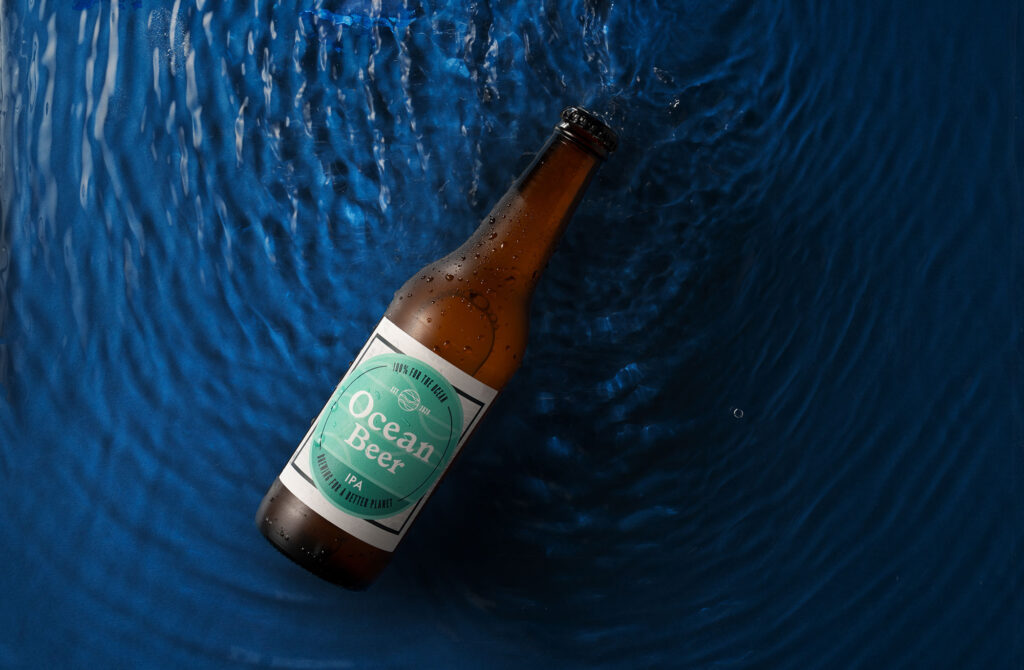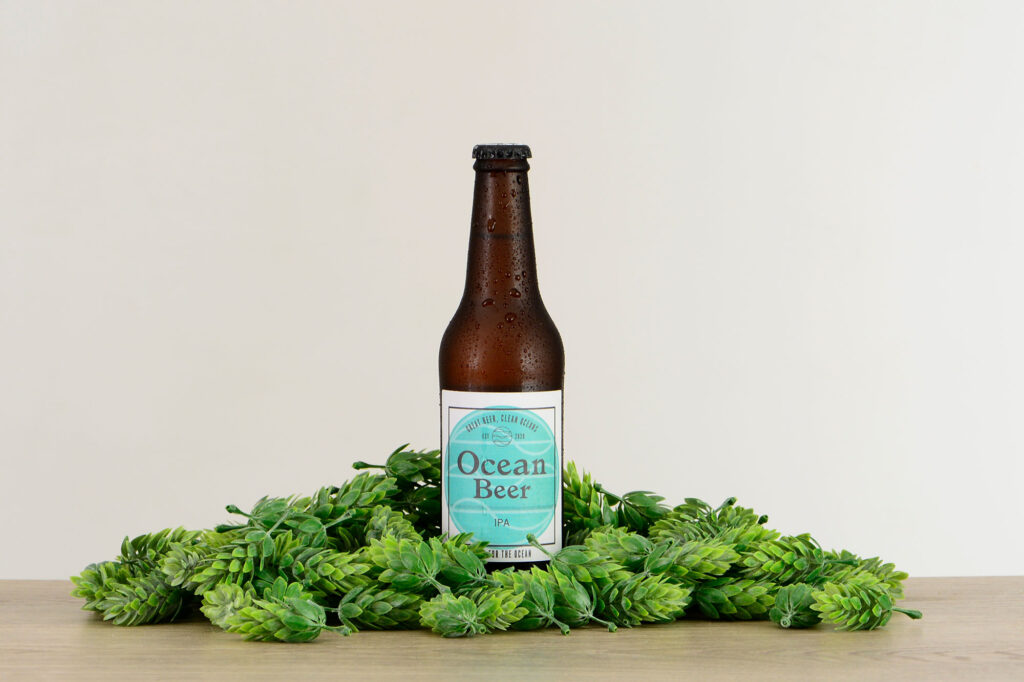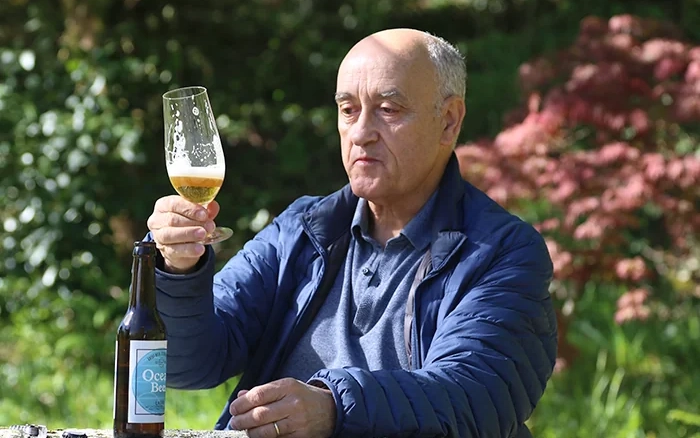OUR COMMITMENT TO THE SDG
At Ocean Beer, sustainability lies at our core and we will work tirelessly to continuously improve. We strive for low water output across our products and logistics capability, including in water usage, energy efficiency, packaging and transport.
We strive to be a fair and transparent organisation, not only regarding our mission but in our actions with clients, distributors, providers and other partners. We carefully screen and select all those we work with. We want to ensure everyone understands the power we each have as consumers to make a difference through our consumption choices.
WHAT MAKES OCEAN BEER PLANET-FRIENDLY?
- Ocean Beer is Vegan
While it is true that the basic ingredients for beer are not derived from animals, not every beer is vegan. Whey, lactose and honey are sometimes added as ingredients for flavour, and traditionally, brewers use isinglass (i.e. fish guts) to filter the liquid.
At Ocean Beer, our brews are free of those additives, and our beer is either unfiltered (IPA) or passed through an algae-based mineral filter.
- No Waste
We believe in a circular economy and try to minimise waste at every stage of production, from bud to bottle.
For example, after brewing, we repurpose grain from our IPA by sending it to farms to feed livestock. This avoids contributing to landfills, and provides all-natural grain for local farms.
- Eco-Friendly Packaging
- Low Impact
We haven’t retrofitted a “good cause” into a good beer, instead we made an ethical beer from the get-go.
We look for brewers who are serious about sustainability. Our partner in Spain, for example, is the brewery with the largest installation of solar panels in Spain and has 100% green energy at its sites.
And what we cannot reduce, we are committed to offset. In 2021 we offset our carbon emissions from the production process by investing in a mangrove restoration project in Pakistan.
- No Toxic-Inks
- Plastic-Free
- Nomadic Beer
There are many things about Ocean Beer that we are proud of, but perhaps one of the greatest is our journey to becoming a “nomadic beer”. We are taking advantage of the excess production capacity around the globe to keep our footprint small and work to bring Ocean Beer to the world one brewing partner at a time. In this way we reduce the environmental impact of new construction, and reduce the distance we have to transport our beer (as transport is typically one of the largest contributors to the carbon footprint of beer).
Our ambition is to brew locally in every market we enter. To be a “nomadic beer”.
We are thankful to have found excellent brewing partners to support us in this mission. Even with the same recipe and the same ingredients, two different breweries will deliver two different liquids. Not to mention our evolving sustainability and traceability criteria… So we are delighted when we find someone who just gets us. Even though it is hard, we think it is most certainly a valuable exercise and one to which we are 100% committed.
WE KNOW WE'RE NOT PERFECT...
BUT WE'RE WORKING ON IT.
Sustainability Commitments

CARBON
- CALCULATE
You cannot improve what you do not measure. We are working again with students in 2022 to select an emissions management platform .
- REDUCE
We continue to seek strategies to lower emissions, from nomadic brewing to night-time deliveries.
- OFFSET
We worked with a team of grad students to start offsetting through blue carbon credits.

WATER
Consuming responsibly.
Beer is one of the most water-intensive industries out there. From cultivating raw materials to producing and washing containers, the average beer takes between 90 and 155 litres of freshwater for every litre of beer. At Ocean Beer we recognise the opportunity to work with our brewing partners to foster curiosity about our impact (positive and negative) and implement strategies to reduce our consumption over time. After all, water unites us all.
- MEASURE
We are working on a due diligence strategy to ensure more transparency with our providers.
- REUSE & RECYCLE
We can work with brewing partners to increase the reuse and recycling of industrial water in the brewing process.
- LOW-IMPACT
By working with providers to switch the kind of malt used in our beer we can reduce the water footprint.

ORGANIC MATERIALS
Biochemical flows.
Like any beer, we depend on four ingredients: barley, hops, water, yeast. Sounds simple, but there is so much more to it. Since we are not a brewery ourselves but work with brewing partners in each country, we do not have full control over the process. However, we are working on a due diligence strategy to ensure that as we grow, our beers are produced in the most planet-friendly way possible. These are some of our goals to be a planet-positive beer.
- TRACEABILITY
We are building on our due diligence strategy to ensure more transparency with our providers.
- NO FERTILISERS
Moving forward, we can work with partners to source ingredients without the use of chemical fertilisers which can damage the environment.
- REGENERATION
By sourcing our ingredients from regenerative growers in the future, we would give more to the planet than we take.
FERNANDO ESCRIBANO
Ocean Beer Master Brewer
Fernando Escribano is an adjunct professor at the University of Maryland and holds a PhD in Animal Science from Iowa State University.
He also holds a PhD in Agricultural Engineering from the Polytechnic University of Madrid, and has 25 years of research experience in the feed industry and academia.
Fernando believes that the ocean is the greatest source of biodiversity.
As an engineer he has developed a great interest in the ocean, biochemistry and circular economy processes in which he advocates the production of goods and services while reducing the consumption and waste of raw materials, water and energy sources.
His current challenge is to design a zero carbon beer of which the quality and stability of the drink is maintained without losing craftsmanship in its production. It would be an environmentally sustainable beer committed to caring for the ocean.,


